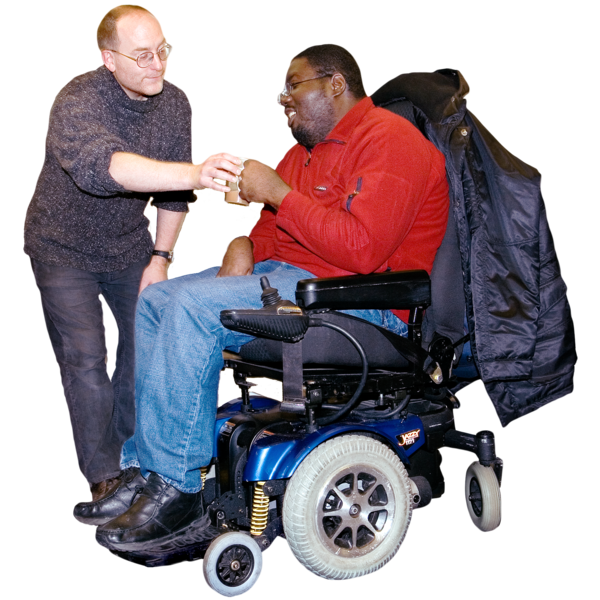Today, Mencap joined the families who are legally challenging
the government
 The Government are the people who run the country. The Government decide how much tax people should pay and how things like the National Health Service (NHS) should work.
over its lack of funding for special educational needs support and stood in full support of their legal challenge.
The Government are the people who run the country. The Government decide how much tax people should pay and how things like the National Health Service (NHS) should work.
over its lack of funding for special educational needs support and stood in full support of their legal challenge.
Yesterday, it was revealed that up to 8,500 children and young people with special educational needs and disabilities are being left out of the education system.
The charity urges the government to properly fund the support that children require, whether it is in the special education needs and disability system or more widely in health and
social care
 Social care means the services that give care and support to people who need it.
. Every child has a right to an education, whether they have a disability or not.
Social care means the services that give care and support to people who need it.
. Every child has a right to an education, whether they have a disability or not.
Ciara Lawrence, Campaigns Support Officer at the learning disability
A learning disability is to do with the way someone's brain works. It makes it harder for someone to learn, understand or do things. charity Mencap who has a learning disability, said:
“I know from personal experience the big difference that the right special educational needs support makes for children with a learning disability.
Until I was 10 I was thought of as ‘naughty’ or ‘lazy’ because I couldn’t engage. As soon as my needs were recognised and the right support put in place, I flourished and was able to enjoy school and pass my exams.
I’m now happily married and in full-time employment
Employment means having a job. . I dread to think what would have happened if the support hadn’t been there – who knows where I’d be now?
The very nature of a learning disability means that every child with a learning disability will need some specialist educational support at some point. There has been an increase in the number of children and young people with a learning disability and it is clear that some children are falling through the gaps.
Currently, the special education needs and disability system lacks the proper funding required to meet every child’s needs. Every child should be able to access the appropriate education, health and social care support to meet their needs.
That’s why I am proud to be representing Mencap today and we stand in solidarity with the families and fully support their legal challenge.
We urge the government to properly fund the support that children require, whether it is in the special education needs and disability system or more widely in health and social care, so that every child can have the best possible start in life."
Find out more on ITV News Online here and listen to Ciara’s speech on our Twitter channel here.
If you are affected by this issue and need advice or support, Mencap can provide one-off information and advice on special educational needs and disabilities.
Contact Mencap’s freephone Learning Disability Helpline on 0808 808 1111 (9am-3pm, Monday-Friday) or email helpline@mencap.org.uk.
-ENDS-
For further information or to arrange interviews, contact Mencap’s media team:
- email media@mencap.org.uk
- phone 020 7696 5414 (including out of hours).
Notes to editors
About Mencap
There are 1.4 million people with a learning disability in the UK. Mencap works to support people with a learning disability, their families and carers by fighting to change laws, improve services and access to education, employment and
leisure
 Leisure is when you have time to do things you enjoy like playing sports or going to the pub.
facilities. Mencap supports thousands of people with a learning disability to live their lives the way they want.
Leisure is when you have time to do things you enjoy like playing sports or going to the pub.
facilities. Mencap supports thousands of people with a learning disability to live their lives the way they want.
For advice and information about learning disability and Mencap services in your area, contact Mencap’s freephone Learning Disability Helpline on 0808 808 1111 (9am-3pm, Monday-Friday) or email helpline@mencap.org.uk .
What is a learning disability?
A learning disability is a reduced intellectual ability which can cause problems with everyday tasks – for example shopping and cooking, or travelling to new places – which affects someone for their whole life;
Learning disability is not a mental illness or a learning difficulty, such as
dyslexia
 Dyslexia is a learning difficulty. People who have dyslexia can find it hard to read, write and spell.
. Very often the term ‘learning difficulty’ is wrongly used interchangeably with ‘learning disability’.
Dyslexia is a learning difficulty. People who have dyslexia can find it hard to read, write and spell.
. Very often the term ‘learning difficulty’ is wrongly used interchangeably with ‘learning disability’.
People with a learning disability can take longer to learn new things and may need support to develop new skills, understand difficult information and engage with other people. The level of support someone needs is different with every individual. For example, someone with a severe learning disability might need much more support with daily tasks than someone with a mild learning disability.